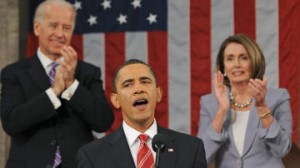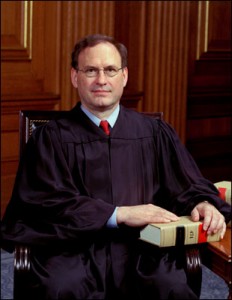Citizens United: U.S. Politics with Chinese Characteristics
Originally Posted on the Huffington Post
In 1966, because of the fear of foreign influence in U.S. elections, Congress passed the Foreign Agents Registration Act. Eventually incorporated in the 1974 Federal Election Campaign Act, the law prohibits foreign governments, foreign political parties, foreign corporations and individuals with foreign citizenship from contributing, donating or spending funds, either directly or indirectly, in any U.S. election.
While this law has been important to the functioning of our democracy, the Supreme Court, in the case of Citizens United v. Federal Election Committee, has moved perilously close to abolishing it and opening the U.S. political process to foreign money, influence and—given the structure of some multinational corporations—direct pressure from foreign governments.
This change stems from the majority opinion’s unprecedented elevation of corporations to equal status with individual citizens in the sphere of political speech. For convenience’s sake, the law does periodically describe corporations as “legal persons” and “citizens” of the state in which they are incorporated. But in Citizens United, the majority has taken this legal short-hand literally. In the majority’s opinion, courts are no longer permitted to take into consideration elements such as limited liability, perpetual life and preferential tax treatment that distinguish a corporation from an individual citizen when analyzing a corporation’s rights, nor are courts allowed to treat corporations differently from actual persons (as they have been doing since the country’s founding.) After Citizens United, the law can no longer look behind the curtain of the corporate form: Citizens United commands that the law pertaining to political speech treat corporations exactly as individual citizens. Simply put, distinctions between corporations and human beings are no longer permissible and limitations on corporations’ political speech are unconstitutional.
In treating corporations the same as individuals, Citizens United leaves the door wide open for foreign influence in our politics. In the case of Chinese corporations, this also means foreign government involvement. Most multinational Chinese corporations, like Haier, China Telcom, and China State Construction Engineering Corporation (CSCE), have U.S. subsidiaries. These are companies incorporated in the United States: Haier’s U.S. subsidiary, Haier American Holding Corporation, China Telecom’s subsidiary, China Telecom Americas, and CSCE’s subsidiary, China Construction America, are all incorporated in Delaware.
Under Citizens United, all three of these subsidiaries are citizens of Delaware and enjoy the same political speech rights  as any other citizen of the United States. Citizens United does not permit us to look behind their corporate veil to see their relationship to foreign corporations. But make no mistake: these subsidiaries are heavily influenced—if not outright controlled—by their Chinese parent corporations. This is not unique to Chinese corporations. In a parent-subsidiary relationship, especially for foreign corporations, there is a lot of overlap between the parent and its U.S. subsidiary; the parent usually owns a majority, if not all of the shares of the subsidiary; capital is often infused to the subsidiary from the parent; and directors from the parent’s board usually sit on the subsidiary’s board of directors. This is the relationship that Haier, China Telcom, and CSCE all have with their U.S. subsidiaries.
as any other citizen of the United States. Citizens United does not permit us to look behind their corporate veil to see their relationship to foreign corporations. But make no mistake: these subsidiaries are heavily influenced—if not outright controlled—by their Chinese parent corporations. This is not unique to Chinese corporations. In a parent-subsidiary relationship, especially for foreign corporations, there is a lot of overlap between the parent and its U.S. subsidiary; the parent usually owns a majority, if not all of the shares of the subsidiary; capital is often infused to the subsidiary from the parent; and directors from the parent’s board usually sit on the subsidiary’s board of directors. This is the relationship that Haier, China Telcom, and CSCE all have with their U.S. subsidiaries.
What is unique to Chinese corporations is the scope of their government ties—indeed, some are controlled outright by the Beijing government. Unlike in, say, Western Europe, places like China, Russia and Vietnam still have a fair share of government-run corporations. Haier, China Telecom and CSCE are all officially government-run. While the Chinese government does not meddle in the corporation’s daily affairs, it will exert its influence if it suits the government’s self-interest. For example, in 1994, Haier, a manufacturer of washing machines and refrigerators, was pressured by the Chinese government into acquiring a pharmaceutical company, a venture that ended badly.
Citizens United allows for the very real possibility of the Chinese government’s direct influence in our elections through a Chinese corporation’s U.S. subsidiary. While no official number exists about the number of Chinese companies with a U.S. subsidiary corporation, Dan Harris, a partner at the international law firm Harris & Moure and editor of the China Law Blog, believes that the number is substantial. “My small firm represents a number of U.S.  companies that are wholly-owned by Chinese companies or by Chinese citizens and that convinces me there must be thousands of such companies in the U.S.” While certainly not all of these Chinese companies with a U.S. presence are directly owned by the Chinese government, there are likely many more than just Haier, China Telecom and CSCE. And given China’s vast currency reserves ($2.4 trillion, the world’s largest), the Chinese government certainly has the money to spend on U.S. elections should it choose to do so. Corporations in other countries, particularly oil-rich ones like Saudi Arabia and Russia, also own U.S. subsidiaries. The threat of foreign involvement in our elections has been noted by the White House, as seen in the Obama’s critique of the decision during his State of the Union, and by Congress as it explores ways to nullify Citizens Untied.
companies that are wholly-owned by Chinese companies or by Chinese citizens and that convinces me there must be thousands of such companies in the U.S.” While certainly not all of these Chinese companies with a U.S. presence are directly owned by the Chinese government, there are likely many more than just Haier, China Telecom and CSCE. And given China’s vast currency reserves ($2.4 trillion, the world’s largest), the Chinese government certainly has the money to spend on U.S. elections should it choose to do so. Corporations in other countries, particularly oil-rich ones like Saudi Arabia and Russia, also own U.S. subsidiaries. The threat of foreign involvement in our elections has been noted by the White House, as seen in the Obama’s critique of the decision during his State of the Union, and by Congress as it explores ways to nullify Citizens Untied.
This issue wasn’t completely lost on the majority in Citizens United—they simply chose not to deal with it. While the majority hinted that there could be a compelling interest in preventing foreign nationals, foreign corporations or foreign governments from influencing the political process, the logic underlying Citizens United’s literal definition of the corporation as citizen prevents this. After Citizens United, courts are no longer allowed to look behind the curtain of the corporate form to the realities of the situation or to distinguish between corporate citizens and individual ones; the majority opinion allows no leeway to examine the foreign origins of the shareholders. For the purposes of political speech, one person’s U.S. citizenship, be it from a passport or from the documents of incorporation, is just as good as another’s; to draw distinctions would be discriminatory.
Given that the majority in Citizens United so easily overturned it previous rulings with regard to limitations on
corporate participation in elections, one ought not expect the Court to maintain any consistency when a case involving political donations from a U.S. subsidiary of a foreign corporation comes before it. The Justices will want to reach the result that American subsidiaries controlled by foreign entities cannot provide support to political activities; Justice Alito, with his mouthing of the word “not true” during Obama’s State of the Union address, certainly signaled this. Such a result, however, will require the Court to overturn the logic of the corporate citizen as equal to an individual citizen. A majority will likely call this an “exception.” In reality, it is more of an excuse. In either case, such a ruling will likely prove difficult to enforce.
Many Chinese corporations have American subsidiaries that are private, i.e., are not subject to the same reporting requirements as publicly-traded ones. In some states, such private corporations have no reporting requirements at all. With a private corporation, it is difficult to determine share ownership, identity of officers or even names of the directors. This difficult detective work will become the responsibility of the Federal Election Commission (FEC). Ironically, the majority in Citizens United found that the campaign finance law’s requirement that corporations work through their Political Action Committees (PACs) during the law’s 30-60 day quiet period was too burdensome since it required copious amounts of paperwork. Imagine the time, effort and money the FEC will be required to put into determining the ownership of any number of private corporations.
In equating corporate citizenship with individual citizenship, the Court does more than just disregard its own rules of precedent and stare decisis. It also provides an image of a corporation completely disconnected from reality, does a grave disservice to our political process and jeopardizes our democracy. And that, Justice Alito, is the truth.
 On Facebook
On Facebook By Email
By Email 

